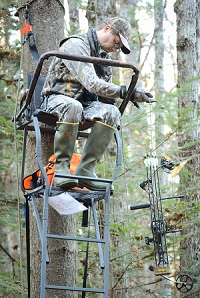
Tree stands get hunters out of sight and smell of wary deer, but they can also get hunters into trouble. Here are some tips from the Vermont Fish & Wildlife Department to help stay safe and get the most out of your tree stand hunting experience:
Choose a live, straight tree.
Buy smart. Only use stands certified by the Treestand Manufacturers Association (TMA).
Inspect them each time you use them.
Know the rules. On state lands, it is illegal to place nails or other hardware into trees or to build permanent structures. On private lands, you must have landowner permission to erect a tree stand, cut or remove trees or other plants, or to cut limbs. All stands, including ground blinds, must be marked with the owner’s name and address.
Always wear a full-body safety harness, even for climbing. Most falls occur going up and down the tree and getting in and out of the stand.
Don't go too high. The higher you go, the vital zone on a deer decreases, while the likelihood of a serious injury increases.
Never carry firearms or bows up and down trees. Always use a haul line to raise and lower all gear. Make sure your firearm is unloaded.
Familiarize yourself with your gear before you go. The morning of opening day is a poor time to put your safety belt on for the first time.
Be careful with long-term placement. Exposure can damage straps, ropes and attachment cords. Also, the stand’s stability can be compromised over time, as the tree grows.
“Hunter education instructors want you to be safe this coming season,” said Nicole Meier, information and education specialist for Fish & Wildlife. “Falls from tree stands are a major cause of death and serious injury to deer hunters, but they are preventable by always wearing a full-body harness and staying connected to the tree.”
Learn more about Tree Stand Safety here: https://www.tmastands.com/safety/
For Immediate Release: September 24, 2019
Media Contact: 802-318-1347; 802-371-9975
